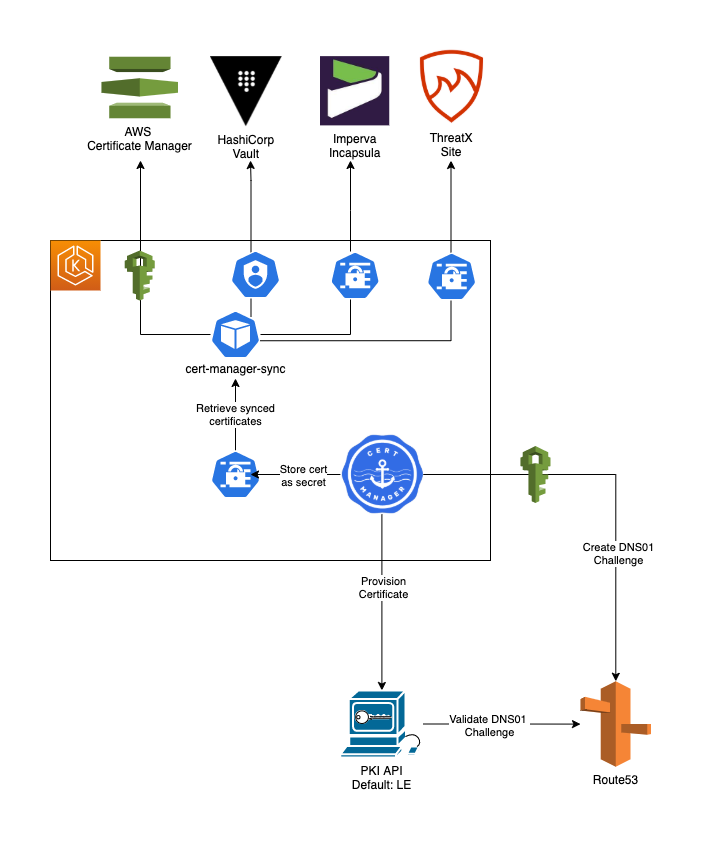cert-manager-sync
Enable Kubernetes cert-manager to sync TLS certificates to AWS ACM, HashiCorp Vault, Incapsula, and ThreatX.
Architecture
Background
In containerized environments, we use cert-manager to automatically provision, manage, and renew TLS certificates for our applications.
These certificates are managed entirely through code using git ops, and developers / operators never need to touch / see the actual plain-text certificate as it is automatically provisioned and attached to gateway.
However for applications that sit behind the Incapsula WAF, or have components in both EKS and CloudFront, there was not a seamless and secure process to attach certificates without operators manually passing DNS01 challenge records back and forth or worse, passing TLS certs back and forth.
In addition to the security risk this poses, it also introduces a level of human error and manual tracking of expiry / renewals.
This operator fully automates this process, so that developers must only annotate their cert-manager kube tls secrets with a flag indicating they want the certificate synced and to where they want it synced.
When the certificate is provisioned by cert-manager, the cert-manager-sync operator will sync the certificate to the upstream certificate provider(s) defined in the TLS secret annotations.
Authentication
AWS ACM
Create an IRSA role with acm:* access, and attach the IAM Role to the k8s ServiceAccount in devops/k8s/sa.yaml.
Incapsula
Create an Incapsula API Key and create a kube secret in the namespace in which the operator runs.
kubectl -n cert-manager \
create secret generic example-incapsula-api-secret \
--from-literal api_id=XXXXX --from-literal api_key=XXXXXYou will then annotate your k8s TLS secret with this secret name to tell the operator to retrieve the Incapsula API secret from this location.
ThreatX
Create a ThreatX API Key and create a kube secret in the namespace in which the operator runs.
kubectl -n cert-manager \
create secret generic example-threatx-api-secret \
--from-literal api_token=XXXXX --from-literal customer_name=XXXXXYou will then annotate your k8s TLS secret with this secret name to tell the operator to retrieve the ThreatX API secret from this location.
HashiCorp Vault
HashiCorp Vault relies on the Kubernetes Auth Method to securely issue the operator a short-lived token according to your Vault policy. This token is then used to sync the updated certs to Vault so that they can be used by Vault-integrated applications and services.
Configuration
The operator uses Kubernetes annotations to define the sync locations and configurations.
The following example contains all supported annotations.
---
apiVersion: v1
type: kubernetes.io/tls
kind: Secret
metadata:
name: example
namespace: cert-manager
annotations:
cert-manager-sync.lestak.sh/sync-enabled: "true" # enable sync on tls secret
cert-manager-sync.lestak.sh/acm-enabled: "true" # sync certificate to ACM
cert-manager-sync.devops.umgapps.com/acm-role-arn: "" # Role ARN to assume if set
cert-manager-sync.lestak.sh/acm-certificate-arn: "" # will be auto-filled by operator for in-place renewals
cert-manager-sync.lestak.sh/incapsula-site-id: "12345" # incapsula site to attach cert
cert-manager-sync.lestak.sh/incapsula-secret-name: "cert-manager-sync-poc" # secret in same namespace which contains incapsula api key
cert-manager-sync.lestak.sh/threatx-hostname: "example.com" # threatx hostname to attach cert
cert-manager-sync.lestak.sh/threatx-secret-name: "example-threatx-api-secret" # secret in same namespace which contains threatx api key
cert-manager-sync.lestak.sh/vault-addr: "https://vault.example.com" # HashiCorp Vault address
cert-manager-sync.lestak.sh/vault-role: "role-name" # HashiCorp Vault role name
cert-manager-sync.lestak.sh/vault-auth-method: "auth-method" # HashiCorp Vault auth method name
cert-manager-sync.lestak.sh/vault-path: "kv-name/path/to/secret" # HashiCorp Vault path to store cert
data:
ca.crt: ""
tls.crt: ""
tls.key: ""Deployment
Create regcred registry credential secret in cert-manager namespace.
kubectl apply -f devops/k8s